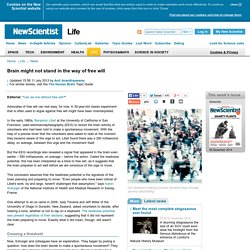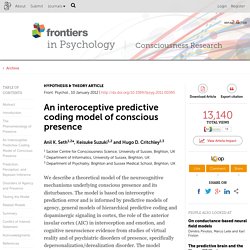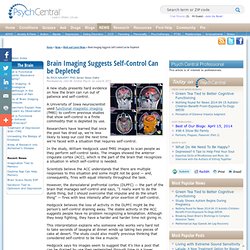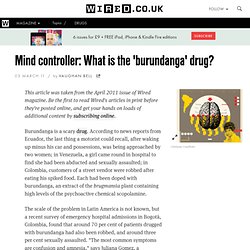

Woman's missing digits grow back in phantom form - health - 10 August 2012. By Helen Thomson A woman born missing a finger and a thumb has grown them back – albeit as part of a phantom limb.

This extraordinary occurrence shows that our brain contains a fully functional map of our body image, regardless of what our limbs actually look like. The woman, RN, was born with just three fingers on her right hand. Aged 18, RN had the hand amputated after a car accident. She later began to feel that her missing limb was still present, and developed a “phantom” hand. “But here’s the interesting thing,” says Paul McGeoch at the University of California, San Diego. Brain might not stand in the way of free will - life - 06 August 2012. Editorial: "Can we live without free will?

" Advocates of free will can rest easy, for now. A 30-year-old classic experiment that is often used to argue against free will might have been misinterpreted. In the early 1980s, Benjamin Libet at the University of California in San Francisco, used electroencephalography (EEG) to record the brain activity of volunteers who had been told to make a spontaneous movement. With the help of a precise timer that the volunteers were asked to read at the moment they became aware of the urge to act, Libet found there was a 200 millisecond delay, on average, between this urge and the movement itself.
But the EEG recordings also revealed a signal that appeared in the brain even earlier – 550 milliseconds, on average – before the action. This conclusion assumes that the readiness potential is the signature of the brain planning and preparing to move. One attempt to do so came in 2009. An interoceptive predictive coding model of conscious presence. Introduction In consciousness science, psychiatry, and virtual reality (VR), the concept of presence is used to refer to the subjective sense of reality of the world and of the self within the world (Metzinger, 2003; Sanchez-Vives and Slater, 2005).

Presence is a characteristic of most normal healthy conscious experience. However, theoretical models of the neural mechanisms responsible for presence, and its disorders, are still lacking (Sanchez-Vives and Slater, 2005). Selective disturbances of conscious presence are manifest in dissociative psychiatric disorders such as depersonalization (loss of subjective sense of reality of the self) and derealization (loss of subjective sense of reality of the world). Depersonalization disorder (DPD), characterized by the chronic circumscribed expression of these symptoms (Phillips et al., 2001; Sierra et al., 2005; Simeon et al., 2009; Sierra and David, 2011), can therefore provide a useful model for understanding presence. Figure 1. Figure 3. Brain Imaging Suggests Self-Control Can be Depleted. By Rick Nauert PhD Senior News Editor Reviewed by John M.

Grohol, Psy.D. on June 8, 2012 A new study presents hard evidence on how the brain can run out of patience and self-control. A University of Iowa neuroscientist used functional magnetic imaging (fMRI) to confirm previous studies that show self-control is a finite commodity that is depleted by use. Researchers have learned that once the pool has dried up, we’re less likely to keep our cool the next time we’re faced with a situation that requires self-control.
In the study, William Hedgcock used fMRI images to scan people as they perform self-control tasks. Scientists believe the ACC understands that there are multiple responses to this situation and some might not be good — and, consequently, fires with equal intensity throughout the task. Free Won't: It may be all that we have (or need) There's lots of research evidence demonstrating that many of our actions are not initiated consciously.

We're not making conscious choices to act. The Blog : Morality Without “Free Will” From the Free Press: A belief in free will touches nearly everything that human beings value.

It is difficult to think about law, politics, religion, public policy, intimate relationships, morality—as well as feelings of remorse or personal achievement—without first imagining that every person is the true source of his or her thoughts and actions. And yet the facts tell us that free will is an illusion. In this enlightening book, Sam Harris argues that this truth about the human mind does not undermine morality or diminish the importance of social and political freedom, but it can and should change the way we think about some of the most important questions in life. In this elegant and provocative book, Sam Harris demonstrates—with great intellectual ferocity and panache—that free will is an inherently flawed and incoherent concept, even in subjective terms. Mind controller: What is the 'burundanga' drug? This article was taken from the April 2011 issue of Wired magazine.

Be the first to read Wired's articles in print before they're posted online, and get your hands on loads of additional content by subscribing online. Burundanga is a scary drug. According to news reports from Ecuador, the last thing a motorist could recall, after waking up minus his car and possessions, was being approached by two women; in Venezuela, a girl came round in hospital to find she had been abducted and sexually assaulted; in Colombia, customers of a street vendor were robbed after eating his spiked food.